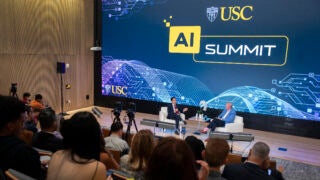USC Dornsife Chemistry Department wins award to explore new methods of evaluating STEM teaching
The American Association of Universities will fund examination of how, with better evaluations, faculty could more accurately refine their undergraduate teaching methods.
The Chemistry Department at the USC Dornsife College of Letters, Arts and Sciences has been selected to pilot a program to overhaul the way the teaching of science, technology, engineering and math (STEM) is evaluated and incentivized, and, in the process, dramatically improve the way these essential courses are taught to undergraduates.
“If we get this right, it could lead to sweeping improvements in how the nation educates its STEM students and prepares them for the job market,” said Barry Thompson, director for Undergraduate Studies and professor of chemistry at USC Dornsife. “This is critical because our nation’s competitive advantage relies to a great degree on STEM graduates who have a solid grounding in their fields.”
The program is being funded by a $100,000 award from the American Association of Universities. The USC Dornsife Chemistry Department was one of only five academic departments in the nation chosen for the award. The other awardees are the departments of Engineering Sciences at Dartmouth College; Chemical and Petroleum Engineering at the University of Kansas; Chemistry at Michigan State University; and Biology at the University of North Carolina, Chapel Hill.
Creating better models for evaluating STEM teaching
According to AAU, the goal is to “create better models for effective and equitable evaluation of STEM teaching; the models could then be adapted to STEM departments at other undergraduate institutions.”
“We’re hoping that our findings will have a multiplier effect by providing a model that other research universities can adopt,” said Stephen Bradforth, former chair of the chemistry department who currently serves as a professor of chemistry and senior adviser to the dean for research strategy and development at USC Dornsife. “If that’s the case, this could lead to a sea change in not only how faculty are evaluated but how they teach STEM courses to undergraduates.”
The program will be managed entirely by Chemistry Department faculty, who will design, test and build confidence in better methods to evaluate their teaching. With evaluations based on evidence of student learning, faculty can more accurately adjust their teaching methods to engage students and thereby increase the number and diversity of well-prepared graduates.
Weaknesses of student evaluations in STEM teaching
Faculty nationwide are currently evaluated solely by student evaluations, a method that experts say falls well short of providing meaningful information with which to measure the effectiveness of teaching. (USC dropped student evaluations as a metric for an instructor’s teaching in 2018, but accepted alternatives to assess teaching effectiveness are still lacking.)
“The only measure of effectiveness in STEM education has come from a single source — the student survey — and it’s widely recognized that we need a far more evidence-based gauge so that we improve the way students are taught,” Thompson said. “I have great confidence in my fellow faculty members to evaluate and implement more effective methods.”
Bradforth emphasized that the project and any new evaluation methods that come from it are not intended to add additional duties for the faculty.
“I recognize that this goes against many aspects of the culture at top research universities,” Bradforth said. “But I am certain that we can accomplish a great deal with ample faculty feedback and by allowing them to determine what works best.”
All five of the demonstration projects are made possible by a $570,000 gift to AAU from the Sarah Gilbert & Carl Wieman Charitable Fund. Wieman was awarded the Nobel Prize in physics in 2001 and subsequently immersed himself in efforts to improve science education.



